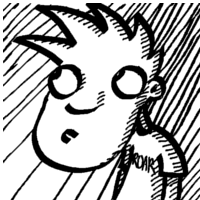You've neglected your story/novel/writing in general long enough. Then what?
I plant myself into a chair of some sort, open up the last bit of writing I've done, and start reading over snippets here and there. Well, it's not really reading, but scraping, seeing which bits come off with my eyes, the ones that stick to my fingers, help me remember what it was that I was doing with this whole project in the first place. I might make a few fixes here and there--nothing I would call revision--but enough to get me back into the groove of things, remind me what it was/is that my character wants in that moment, what's pissing them off, what's breaking their heart. Once that's done, I can often slip back into a rhythm, start chipping away at that negligence block and add to my story once again.
Usually, I don't work with an outline and I'm forced to simply follow my characters around and wait for something to happen. This makes for lots of cutting/rewriting later, but it's time well spent, as I get to see how they get from here to there, what they linger over, what catches their eye. Also, having something to cut is better than an empty page. Empty pages give you nothing. NOTHING. Hopefully though, something happens in this character stalking process, something unexpected or worth hanging around to witness. Once this occurs, I'm fired up and ready to roll. Other times, when nothing shows up, I've just written a bunch of boring nothing.
When this boring nothing occurs--and I'm sure it will--I take a break, play some video games, drink some Dr. Pepper or Chai, talk to my wife for a few minutes, hassle my cats, something to let my mind focus on other things. There are times I forget to go back to my writing and fall right back into negligence, but going back is always, always the best. The times I remember to go back, I sit, start scraping again, a little harder this time, and I see what comes off in my hands. Inevitably there will be a piece of a paragraph, a few words, a sentence that sparks an ides and helps me to see what this moment/scene needs--even if that means taking a cue from Monty Python and going to something completely different.
(A piece of advice that I've learned: WHEN IN DOUBT ABOUT WHERE YOUR STORY IS GOING, LOOK TO WHAT HAS COME BEFORE IT. THE ANSWER IS ALWAYS IN THE PAST.)
After that, it is simply a matter of keeping myself in my chair and letting my fingers do the work. For me, a set word count is a great way of not only keeping track of how much I write on a daily basis, but it gives a goal, a tangible number that I can attain. I shoot for 1,000 words a day. Sometimes, I overshoot--if you're really in the groove, why stop? Other times, I come up short--WAY short. Regardless, it gives me the grounding I need to "feel" like I've written and been productive for the day. A chunk of time would work too. Say, a half an hour every day that you DEVOTE--no email, internet, news reading, wall staring, nothing--to writing. This might even be better, as you won't feel let down by not meeting your word count. You burned the keyboard for your set time and wrote what you could.
The importance of this step in my writing process is simply for my brain and heart and fingers to remember what it is that they've been missing: their purpose, their joy, their horrendous witch of a lover that is writing. Once they have, it's much harder to fall back into neglecting such an exquisite beast.
Subscribe to:
Post Comments (Atom)





1 comment:
Sometimes I do all this and then (if it's been awhile, which sometimes it has) I'm like...how did I even write any of that? How do I even write anything? It's a weird feeling.
I think this must be a trend right now. I've been reading a lot of writer blogs where people are talking about trying to get into the writing mud again.
Post a Comment